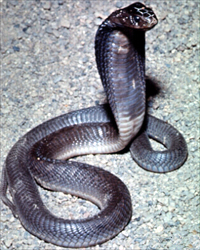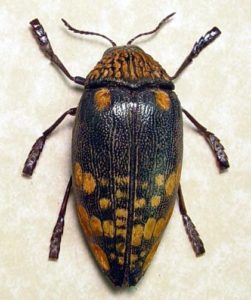Before, this afternoon I had never laid eyes on a spitting cobra. Not up close, not uncaged out in the wild. And clearly, not mere steps from my children’s sand box where they often played.
The serpent measured seven feet.
“Mpiga, Mpiga (stone it, stone it)!” Twenty children’s excited voices shattered the mission station’s quiet. They had come upon the snake as they were heading home, taking a short cut across our unfenced property.
Swinging the back screen door open, I took in the spectacle from our veranda.
“Looks like the school kids got an enemy in their sights, hon.”
At this point the serpent hadn’t moved into my view. On the other hand, the eyes of the clamorous nine-to-twelve-year olds, had stayed fixed, tracing the cobra’s every fleeting move before them. The snake raced slithering through foot-high grass, barely ahead of the children’s hail of ammo – sticks and stones – raining down.
The moment the cobra enter our grounds, I shouted, “Rafel!” The muscular young day-laborer rushed toward my voice. Seeing the danger – to the children, to all of us – he raced with his panga to a nearby tree. In seconds a limb plopped to the ground. Rafel alighted. Slashing swiftly again and again, he soon displayed an impressive club – long enough to go after the snake while, hopefully, staying short of its notorious venom shower.
Although our own children were safely indoors with their mother, a chill went over me as I witnessed one of Africa’s most feared slithering creatures swing about to face Rafel and me. I shivered at the knowledge that Julie and Scott’s sandbox lay two meters away in the shade of our backyard Flame Tree.
The forebody of the snake rose thirty inches from the ground’s surface, spread wide its menacing hood and shot a toxic stream of spray, thankfully short of its targets – the workman and me. It then turned and, spotting a fractured entrance-way into an abandoned chicken coop, slithered inside.
With more anxiety than either Rafael or I cared to claim, we heaved the door aside. The cobra’s head once again swung our direction. The snake moved from the far end of the little coop directly toward us, its speed fueled by the panic that drives any creature feeling trapped. We dare not block its exit. . . that would be nuts, for sure.
On our back lawn once again – and once again by the sand box – the cobra struck a motionless pose. It was the split second Rafel needed to take aim. The thicker end of the African’s club crashed to the reptile’s head. The aim was exact and the snake lay still but for its long body writhing some seconds.
The cheering primary school kids quieted, gradually dispersed, moving the direction of their thatched and tin-roofed homes.
I took little interest in Cobras or their skins for now. My lengthy, salt-crusted curing plank would lie undisturbed this day. It was enough for me that our two-year-old and four-year-old were each well. That the four of us would dine together tonight. Safe and undisturbed.
© 2017 Jerry Lout Image Black-necked Cobra CreationWiki.



